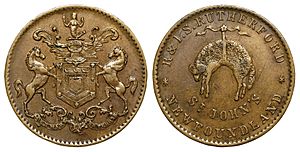Coins of the Newfoundland dollar facts for kids
Newfoundland, which was once a separate British colony, created its own money system with coins from 1865 to 1947. The coins of Newfoundland are very important in history. This is because Newfoundland was a British colony until 1907. Then, it became a self-governing country called a Dominion until 1949. That's when Newfoundland and Labrador officially joined Canada as its tenth province.
Contents
Early Coins: Traders' Tokens
Before Newfoundland had its own official coins, people used special "tokens." These tokens were like private money made by local businesses.
Rutherford Brothers' Tokens
The very first tokens in Newfoundland were Halfpenny tokens. Two brothers, Robert and I.S. Rutherford, made these in St. John's in 1840 and 1841. Some of these tokens have a date, and some do not.
In 1846, a big fire destroyed the Rutherford store in St. John's. After the fire, two other Rutherford brothers, George and Andrew, opened a new store. This new store was in Harbour Grace. They also made new tokens that said "RUTHERFORD BROS." These tokens were made in Birmingham, England, at a place called Heaton's Mint. You can tell these tokens apart because they have a special 'RH' mark above the date.
Peter M'Auslane's Farthing
Another early token was a "farthing" (a very small coin). It was made in the 1840s by Peter M'Auslane. He was a merchant, which means he sold many different kinds of goods, in St. John's. His business was also destroyed in the 1846 fire. After the fire, he left Newfoundland and moved to what is now Ontario.
This farthing is very rare. On the front, it says "PETER M'AUSLANE St. JOHNS NEWFOUNDLAND." On the back, it says "SELLS ALL SORTS OF SHOP & STORE GOODS."
Tokens Without Names
Some tokens were made without any name or place on them. There were two types of these "anonymous" tokens. One was a Halfpenny token from 1858, and the other was a Halfpenny token from 1860.
The 1858 Halfpenny token is very rare. It has a picture of a ship on the front. This ship looks like the ships on other Halfpenny tokens from Prince Edward Island. The date "1858" is written alone in the middle of the back of the coin.
The 1860 Halfpenny token is not as rare. It has the date "1860" in the middle of the front, inside a circle. Around the circle, it says "FISHERY RIGHTS FOR NEWFOUNDLAND." The back of this token says "RESPONSIBLE GOVERNMENT" around the outside, and "AND FREE TRADE" in the middle. This token was making a political statement. It supported the fishing industry and asked for "responsible government." This meant that the people of Newfoundland wanted more control over their own laws and decisions.
Newfoundland Dollar Coins (1865–1947)
In 1865, Newfoundland decided to change its money system. It switched to a "decimal currency," just like Canada, New Brunswick, and Nova Scotia had done. This means money was based on units of ten, like cents and dollars. Before the official coins were made, some test coins were created in 1864.
Newfoundland was the only British colony in North America to have its own gold coin. At first, they thought about making a one-dollar gold coin. But they decided it might be too small and easy for fishermen to lose. So, they chose to make a two-dollar gold coin instead. This gold coin was special because it showed its value in three ways: $2, 200 cents, and 100 pence (which was its value in British money).
Later versions of the dollar coins are also unique. They show King George VI with a crown on his head. This crowned picture was usually used for coins in other British colonies like Hong Kong or India. But for regular Canadian coins, the King was shown without a crown.
Newfoundland Dollar Coin Collection
Here are some of the different coins that were part of the Newfoundland dollar system:
| Monarch | Value | Obverse/Reverse | Years Issued | Designer |
|---|---|---|---|---|
| Queen Victoria |
|
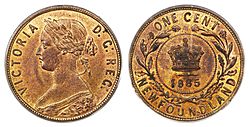 |
1865, 1872(H) 1873, 1876(H) 1880, 1885 1888, 1890 1894, 1896 |
Horace Morehen (design) Thomas Minton (engraving) |
|
|
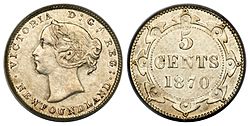 |
1865, 1870 1872(H), 1873 1876(H), 1880–81 1882(H), 1885 1888, 1890 1894, 1896 |
Leonard Charles Wyon | |
|
|
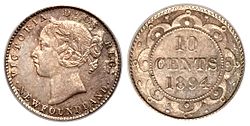 |
1865, 1870 1872(H), 1873 1876(H), 1880 1882(H), 1885 1888, 1890 1894, 1896 |
Leonard Charles Wyon | |
|
|
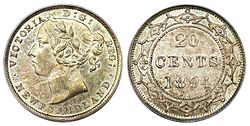 |
1865, 1870 1872(H), 1873 1876(H), 1880–81 1882(H), 1885 1888, 1890 1894, 1896 1899, 1900 |
Leonard Charles Wyon and Horace Morehen |
|
|
|
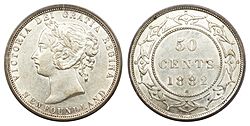 |
1870, 1872(H) 1873–74, 1876(H) 1880–81, 1882(H) 1885, 1888 1894, 1896 1898–1900 |
Leonard Charles Wyon | |
|
|
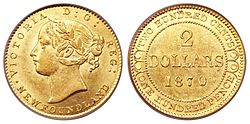 |
1865, 1870 1872, 1880–81 1882(H), 1885 1888 |
Leonard Charles Wyon | |
| King Edward VII |
|
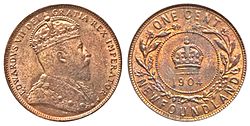 |
1904(H) 1907 1909 |
George William de Saulles (front) Horace Morehen (back) |
|
|
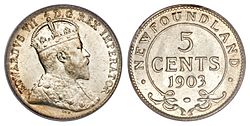 |
1903 1904(H) 1908 |
George William de Saulles | |
|
|
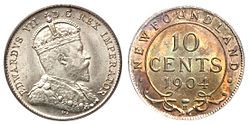 |
1903 1904(H) |
George William de Saulles | |
|
|
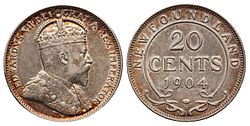 |
1904(H) | George William de Saulles (front) W.H.J. Blakemore(back) |
|
|
|
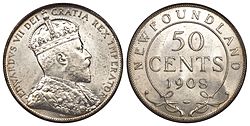 |
1904(H) 1907–09 |
George William de Saulles (front) W.H.J. Blakemore (back) |
|
| King George V |
|
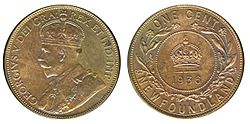 |
1913 1917(C) 1919–20(C) 1929 1936 |
Edgar Bertram MacKennal (front) Horace Morehen (back) |
|
|
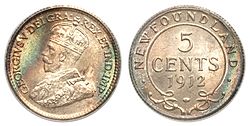 |
1912 1917(C) 1919(C) 1929 |
Edgar Bertram MacKennal (front) George William de Saulles (back) |
|
|
|
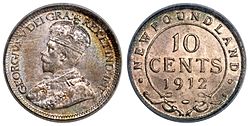 |
1912 1917(C) 1919(C) |
Edgar Bertram MacKennal (front) George William de Saulles (back) |
|
|
|
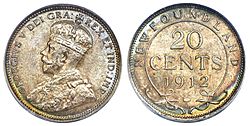 |
1912 | Edgar Bertram MacKennal (front) W.H.J. Blakemore (back) |
|
|
|
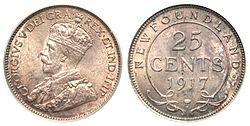 |
1917(C) 1919(C) |
Edgar Bertram MacKennal (front) W.H.J. Blakemore (back) |
|
|
|
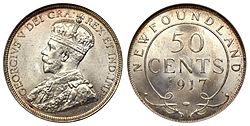 |
1911 1917–19(C) |
Edgar Bertram MacKennal (front) W.H.J. Blakemore (back) |
|
| King George VI |
|
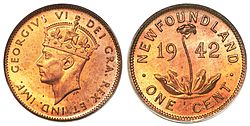 |
1938, 1940 1941(C), 1942 1943–44(C) 1947(C) |
Percy Metcalfe (front) Walter J. Newman (back) |
|
|
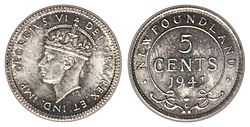 |
1938, 1940–43(C) 1944–47(C) |
Percy Metcalfe (front) George William de Saulles (back) |
|
|
|
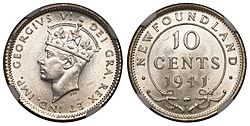 |
1938, 1940 1941–44(C) 1945–47(C) |
Percy Metcalfe (front) George William de Saulles (back) |
 | Stephanie Wilson |
 | Charles Bolden |
 | Ronald McNair |
 | Frederick D. Gregory |


